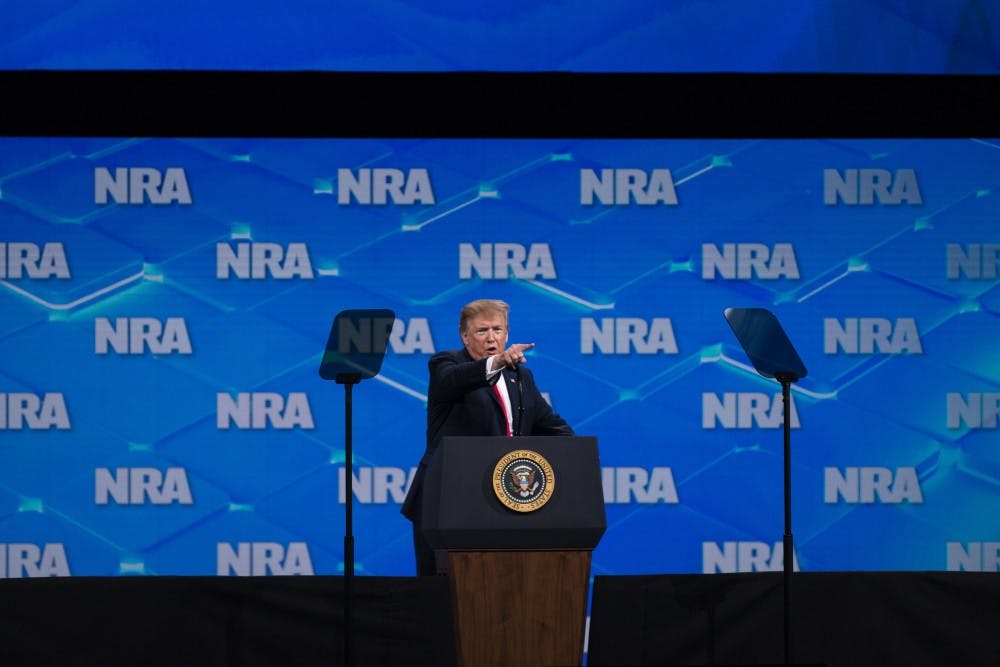It has been less than a week since President Trump’s unilateral order to withdraw troops from northern Syria, and already a humanitarian crisis is developing.
The United Nations reported Oct. 11 that an estimated 100,000 people have fled their homes and seven civilians have been killed. Turkish President Recep Tayyip Erdogan has used the vacuum created by the American withdrawal to launch an assault against the Kurds, who the Turkish government views as a terror group.
The Kurds are an ethnic group that resides in parts of Turkey, Syria, Iraq and Iran. They also happen to be an indispensable American ally in the fight against ISIS.
Although the idea of detangling the U.S. in the Middle East is politically appealing, rushed exits like that of the Trump administration in Syria will only cause more chaos than American commitment in the region.
History has shown that abrupt exits lead to power vacuums, which can be exploited by powerful factions especially when a central government has little to no means to defend itself.
For example, in early 1991, when Desert Storm was coming to an end, President George H.W. Bush suggested that Iraqis “take matters into their own hands and force Saddam Hussein, the dictator, to step aside." On March 1, the U.S. officially ended Desert Storm and its military presence was significantly diminished.
Nevertheless, Iraqi Kurds and Shiite Muslims answered Bush’s call to arms and started a rebellion. Rebel forces advanced quickly, however, Hussein’s army eventually regrouped and quelled the revolt. Despite the pleas of Kurdish and Shiite leaders, the United States never attempted to bolster the rebels’ momentum to help them take Baghdad and depose Saddam Hussein.
Surely enough, in 2003, President George W. Bush was faced with the decision of whether or not to invade Iraq. George W. Bush aided by his advisers, many of whom worked for his father, decided to invade Iraq to topple Hussein. What followed was the Iraq war, which was one of the most drawn out and expensive wars in American history.
The conditions are nearly the same in Syria. Without an American military presence ensuring stability, Turkey has filled in the gap, forcing Kurdish militia forces to defend against a greater military power. The chances of the Kurds prevailing are grim.
Gen. Mazloum Kobani Abdi, commander of the Kurdish Syrian Democratic Forces, told a senior U.S. diplomat, “You have given up on us. You are leaving us to be slaughtered."
However, on Oct. 13, the Kurdish-led administration in northern Syria signed an agreement with the Syrian government that allows for the Syrian army to be deployed in Kurdish-led Syria to re-take Turkish-held cities, which might provide a glimmer of hope for the survival of the Kurds.
The Kurds are also influential allies in the fight against ISIS. They operate 20 facilities that house 10,000 prisoners who have links to ISIS. Now that Turkey has launched its invasion of Kurdish territory, the Kurds must divert manpower from the prisons to the frontlines.
This has led to the escape of at least 750 people with suspected links to ISIS from these camps. A resurgence in ISIS would decrease stability in Syria but also seriously threaten American national security. Like in Iraq, the United States may find itself committing more troops in the Middle East to fight ISIS in future years.
Moreover, the Kurds sustained 11,000 causalities while fighting ISIS in Syria. This withdrawal is an outright betrayal of the Kurdish people, and if ISIS regains strength, it would mean 11,000 Kurds died in vain.
Not to mention the Kurds are one of the most oppressed groups in the world today. In Turkey, they have faced state-run discrimination for decades and were the victims of a genocide in Iraq under Saddam Hussein during which the estimated death toll is somewhere between 50,000 to 182,000.
The Trump administration’s action just solidifies the well-known belief that an American handshake does not mean much. If there is a second offensive against ISIS, it will be undoubtedly more difficult without the Kurds as an U.S. ally.
Additionally, the mass exodus of Kurdish civilians fleeing the Turkish military has caused a humanitarian crisis that will destabilize neighboring countries and possibly Europe by flooding them with refugees.
The moral issues in Trump’s decision to withdraw troops from northern Syria are just as egregious as the security implications.
Despite bipartisan backlash, Trump stands by his action. On Oct. 7 he tweeted “I was elected on getting out of these ridiculous endless wars." Yet so far, the hasty exit from Syria has only caused more violence.
The Middle East is not “someone else’s problem.” The United States must take ownership of its military blunders that have caused some of the current violence in the region by taking on a larger role in preserving the peace.






